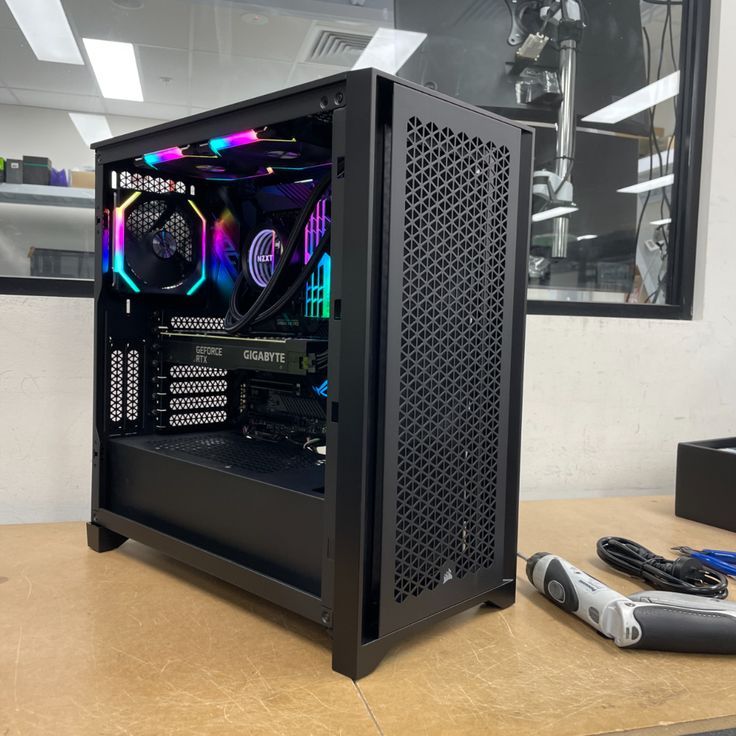Introduction
In the dynamic world of gaming, the importance of having a powerful and reliable gaming PC cannot be overstated. Unlike standard computers, gaming PCs are designed to handle the demanding requirements of modern games, providing enhanced graphics, faster processing, and an overall engaging experience. This blog will explore the ins and outs of gaming PCs, including essential components, types of gaming PCs, benefits, and tips on how to choose the best one for your needs.
The Significance of Gaming PCs
Gaming PCs serve as the backbone of any serious gaming setup. With advancements in technology, games have become increasingly complex, requiring more from hardware. A dedicated gaming PC ensures that you can run the latest titles smoothly while experiencing stunning graphics and minimal lag. Whether you’re into single-player RPGs, fast-paced games, or extensive open-world games, having the right gaming rig is crucial.
Key Components of a Gaming PC
- CPU (Central Processing Unit)
- Often referred to as the brain of the computer, the CPU processes all instructions and performs calculations. For gaming, a powerful CPU is essential to ensure smooth gameplay. Popular choices include Intel Core i5 and i7, and AMD Ryzen 5 and 7 series processors.
- GPU (Graphics Processing Unit)
- The GPU is responsible for rendering images, animations, and video. A strong GPU is vital for gaming, as it directly impacts graphics quality and frame rates. NVIDIA GeForce RTX series and AMD Radeon RX series are top contenders in the market.
- RAM (Random Access Memory)
- RAM affects how many applications can run simultaneously without slowing down the system. For gaming, 16GB is the standard recommendation, although many gamers opt for 32GB for future-proofing and multitasking.
- Storage Solutions
- Storage can significantly impact loading times and overall performance. Solid State Drives (SSDs) offer faster read/write speeds compared to Hard Disk Drives (HDDs), making them ideal for gaming. Many gamers choose a combination of SSD for the operating system and a large HDD for additional storage.
- Cooling Systems
- Gaming generates heat, especially when running demanding titles. Effective cooling solutions, such as air or liquid cooling, are necessary to maintain optimal temperatures and prevent overheating, which can damage components over time.
Types of Gaming PCs
- Pre-built Gaming PCs
- These are ready-to-use systems that come assembled from the manufacturer. They offer convenience and often come with warranties, making them a popular choice for those who prefer not to build their own rig. Brands like Alienware and HP Omen offer a range of pre-built options.
- Custom-built Gaming PCs
- Custom builds allow gamers to handpick each component based on personal preferences and needs. This route often leads to better performance for the price, as you can optimize each part according to your gaming style.
- Gaming Laptops
- For gamers on the go, gaming laptops provide portability without sacrificing too much power. While they may not match desktop PCs in performance, many models offer excellent specs and are perfect for travel.
Benefits of Investing in a Gaming PC
- Customization: One of the most significant advantages of gaming PCs is the ability to customize your setup. You can choose every component, from the case design to the cooling system, ensuring that your PC fits your specific gaming needs.
- Performance: Gaming PCs are designed to deliver high performance, allowing you to play the latest titles at the highest settings without lag or frame drops. This is particularly important for competitive gamers who rely on quick reactions.
- Future-proofing: With technology advancing rapidly, investing in a gaming PC means you can upgrade individual components over time. This is far more cost-effective than purchasing an entirely new system every few years.
- Versatility: Beyond gaming, a powerful gaming PC can handle a variety of tasks, from video editing to 3D rendering, making it a versatile tool for any enthusiast.
How to Choose the Right Gaming PC
- Determine Your Budget
- The first step is to set a budget. Gaming PCs can range from a few hundred to several thousand dollars. Knowing your budget helps narrow down your options and ensures you get the best value for your money.
- Identify Your Gaming Needs
- Consider what types of games you play. If you enjoy AAA titles with high graphical demands, invest in a robust GPU and CPU. Casual gamers might find that a mid-range setup suffices.
- Research Components
- Familiarize yourself with the various components and their specifications. Online forums, reviews, and comparison sites can provide valuable insights into which parts perform well together.
- Future Upgrade Potential
- Consider a system that allows for easy upgrades. This could mean choosing a motherboard with extra slots for RAM or ensuring that the power supply can handle future GPU upgrades.

